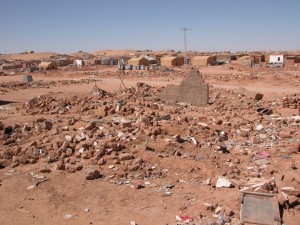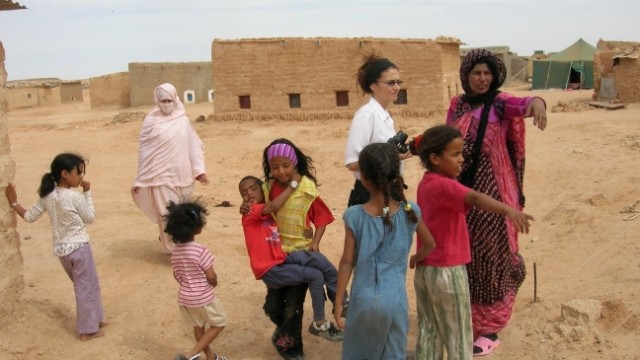
Photo : EC/ECHO/Daniela Cavini
A Sahrawi girl recounts how her mother saved her during the worst flooding since 1975
TINDOUF – The camp known as the ’27 February’ is located in a steep-sided, narrow and winding canyon. It is ideal for channelling rainwater and this was why, after three days of solid rain, 30 years worth of buildings made from earth bricks collapsed. During the night of 11 February, a mountain of water rained down upon the Saharan refugee camp in the region of Tindouf, in south west Algeria. It was an exceptional event – a downpour in the middle of the desert.
“The house where I lived was as old as me, built in 1989, the year I was born. I had lived there my whole life. Now, there’s nothing.” Sitting on the ground, 16-year old Nasiha Mohamezd Mbarek, hugs her two-year old brother Mohamed Lamin. In the tent where she is now living, her mother prepares tea while her father, outside, is in the process of putting up the walls of his family’s future shelter.
“I remember that night well, it rained so hard’ recounts Nasiha. “The water begab to pour in; the current was so strong that it took everything away with it. We were scared. At two o’clock in the morning, our mother called her seven children to her and said ‘now we need to flee, run quickly!’ We sought refuge on a nearby hill. It was hard to climb and we slipped and fell. It continued to rain throughout the night and we stayed there in the rain without shelter without moving. But at least the floodwaters couldn’t reach us there.”
When the Mbarek family went back home, in the early hours of the morning, they found their house still standing but covered in cracks. On 12 February, the dawn revealed the devastation. Collapsed buildings, animal carcasses, a thick layer of mud covered anything that was left. The torrents of water and mud had carried away most of the family’s possessions. Some items could be saved, wiped off. A carpet, two plates, a television that had been secured on the roof of a neighbour’s van. Some hours later, the walls and bricks start to give way, falling in on themselves with a dull noise.
“We lost everything,” Nasiha continues: “our stock of food, flour, lentils, oil…” The call for help went out speedily, alarming messages reached the offices of the humanitarian organisations that are involved in assisting the Saharan refugee population. Three of the four camps in Algeria were devastated by the flooding. The Algerian army arrived on the day of disaster itself to deliver vital initial relief..
On 14 February an emergency decision was taken by the European Commission and €900,000 was provided through its Humanitarian Aid department (ECHO), to help address the most urgent needs. ECHO’s partners – the UN High Commissioner for Refugees and the World Food Programme – saw to the distribution of food, tents, blankets, mattresses and plastic tarpaulins. “It’s strange,” observes Nasiha. “Before the flooding, we received aid but I felt that the world had forgotten us. I’m almost grateful for this misfortune, because at last we have regained a bit of attention.”
The refugees’ main school partially collapsed and many others were so badly damaged that they could be re-opened until serious consolidation works had been completed.
Daniela Cavini
ECHO Regional Information Officer – Amman

